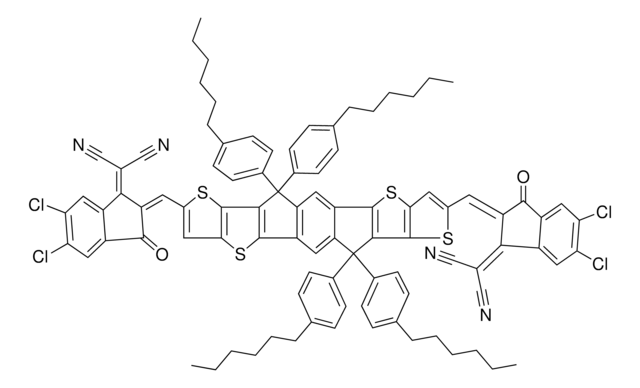753955
ICBA
99% (HPLC)
Synonyme(s) :
1′,1′′,4′,4′′-Tetrahydro-di[1,4]methanonaphthaleno[1,2:2′,3′,56,60:2′′,3′′][5,6]fullerene-C60, C60 derivative, indene-C60 bisadduct
About This Item
Produits recommandés
Pureté
99% (HPLC)
Forme
solid
Perte
0.5 wt. % TGA, 235 °C
Pf
253-260 °C
Énergie orbitale
LUMO 3.67 eV (CV)
Performance des dispositifs OPV
ITO/PEDOT:PSS/P3HT: ICBA (1:1)/Al
ITO/PEDOT:PSS/P3HT:ICBA(1.5:1)/LiF/Al
Vous recherchez des produits similaires ? Visite Guide de comparaison des produits
Description générale
Application
Mention d'avertissement
Warning
Mentions de danger
Conseils de prudence
Classification des risques
Eye Irrit. 2 - Skin Irrit. 2 - STOT SE 3
Organes cibles
Respiratory system
Code de la classe de stockage
11 - Combustible Solids
Classe de danger pour l'eau (WGK)
WGK 3
Point d'éclair (°F)
Not applicable
Point d'éclair (°C)
Not applicable
Certificats d'analyse (COA)
Recherchez un Certificats d'analyse (COA) en saisissant le numéro de lot du produit. Les numéros de lot figurent sur l'étiquette du produit après les mots "Lot" ou "Batch".
Déjà en possession de ce produit ?
Retrouvez la documentation relative aux produits que vous avez récemment achetés dans la Bibliothèque de documents.
Les clients ont également consulté
Articles
Organic materials in optoelectronic devices like LEDs and solar cells are of significant academic and commercial interest.
Organic materials in optoelectronic devices like LEDs and solar cells are of significant academic and commercial interest.
Organic materials in optoelectronic devices like LEDs and solar cells are of significant academic and commercial interest.
Organic materials in optoelectronic devices like LEDs and solar cells are of significant academic and commercial interest.
Notre équipe de scientifiques dispose d'une expérience dans tous les secteurs de la recherche, notamment en sciences de la vie, science des matériaux, synthèse chimique, chromatographie, analyse et dans de nombreux autres domaines..
Contacter notre Service technique

![[6,6]-Phenyl C61 butyric acid methyl ester ≥99%](/deepweb/assets/sigmaaldrich/product/structures/359/221/d990c746-0960-4c69-bf76-fe09b193824d/640/d990c746-0960-4c69-bf76-fe09b193824d.png)



![[6.6] Diphenyl C62 bis(butyric acid methyl ester)(mixture of isomers) 99.5%](/deepweb/assets/sigmaaldrich/product/structures/213/478/93c26667-6556-40bb-8cbe-350bdbabfc00/640/93c26667-6556-40bb-8cbe-350bdbabfc00.png)

![4-(1′,5′-Dihydro-1′-methyl-2′H-[5,6]fullereno-C60-Ih-[1,9-c]pyrrol-2′-yl)benzoic acid](/deepweb/assets/sigmaaldrich/product/structures/417/736/540e4dd8-0c87-48e5-8307-3befb16498ba/640/540e4dd8-0c87-48e5-8307-3befb16498ba.png)

![2-{[7-(5-N,N-Ditolylaminothiophen-2-yl)-2,1,3-benzothiadiazol-4-yl]methylene}malononitrile 99% (HPLC)](/deepweb/assets/sigmaaldrich/product/structures/369/847/83afd245-0ae2-49bf-b44e-bcc0dd348c82/640/83afd245-0ae2-49bf-b44e-bcc0dd348c82.png)
